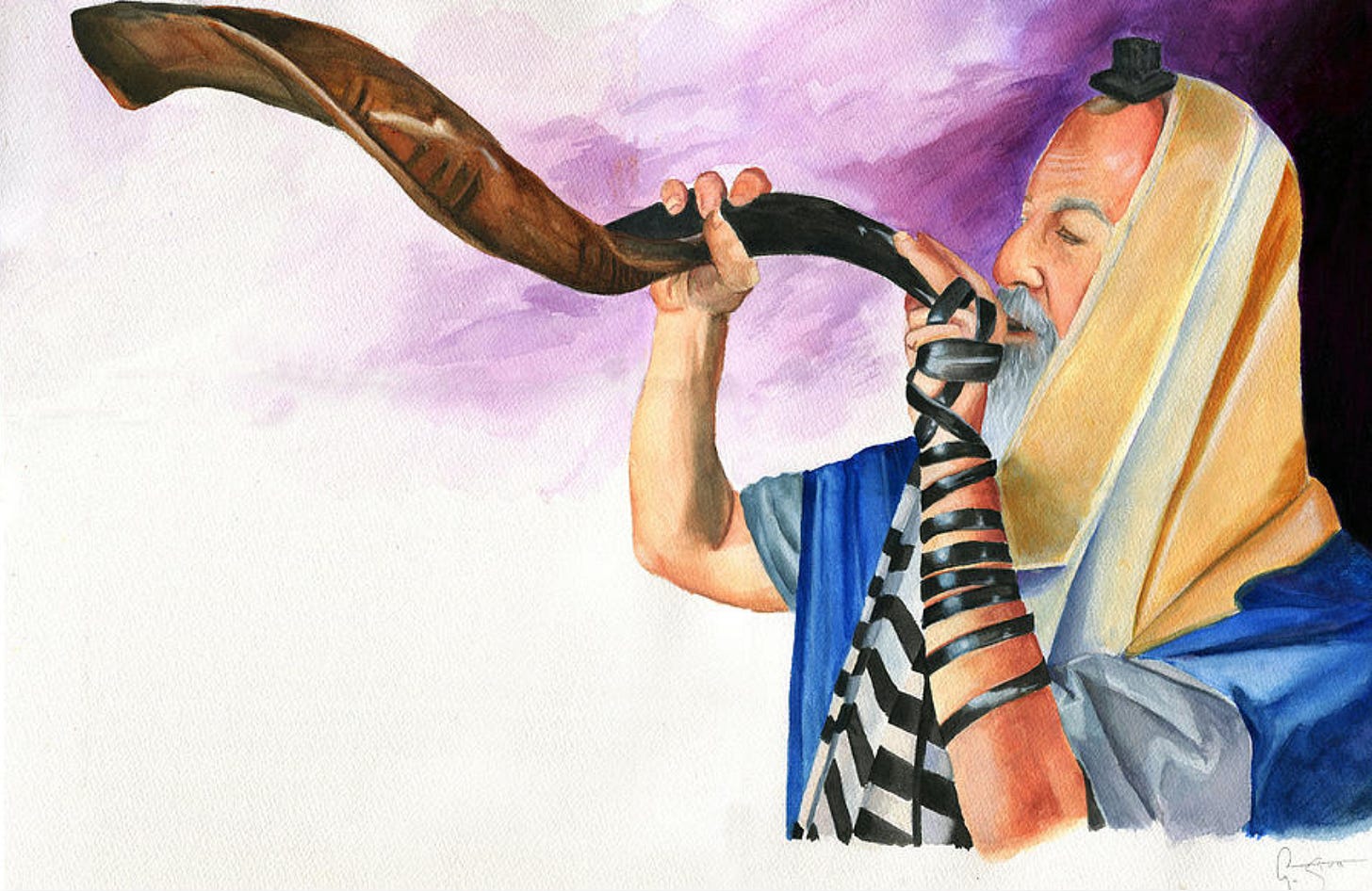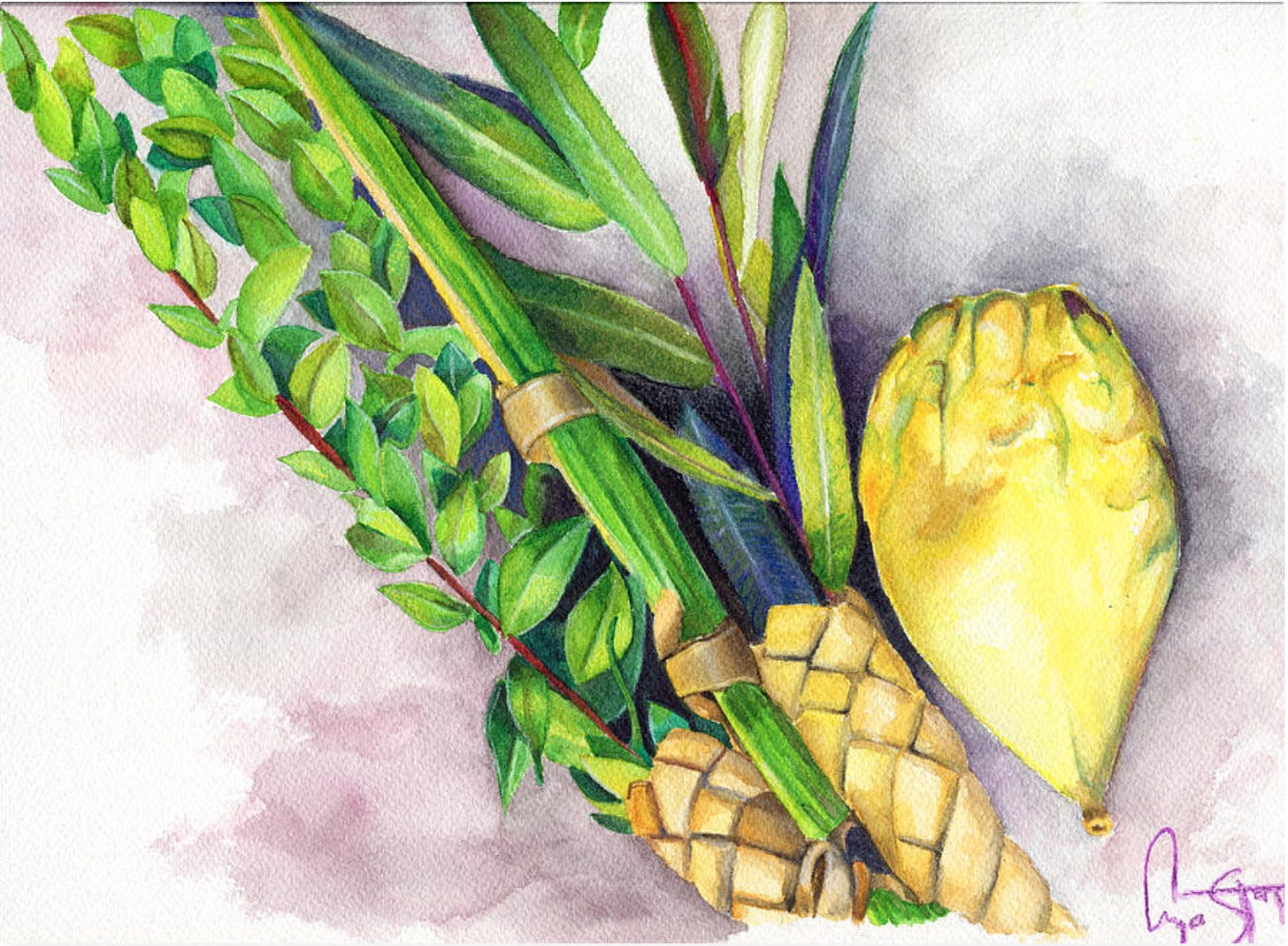Days of Awe
God's Reaching During Times of Turmoil
One September afternoon while washing dishes, I noticed an unusual baying sound coming from outside. At first I dismissed it as a passing animal or vehicle, but it sounded repeatedly, and I started to notice musical patterns. I realized it was the blowing of a Jewish shofar, or ram’s horn, part of the Rosh Hashanah services at one of the synagogues in my neighborhood. The sound marks the beginning of the Days of Awe, a period of personal reflection, drawing closer to God, and preparation for the holiest day of the year in Jewish faith, Yom Kippur.
I had rented a duplex in a historically Jewish neighborhood when I began working at McGill University’s multi-faith space, so I regularly came into contact with Jewish people and their practices. At work, I enjoyed conversations about religious life and community with local Jewish leaders and students. A Hasidic rabbi happened to purchase the house I lived in, and I became acquainted with him as my landlord. In the evenings, I watched the series Jewish Matchmaking to learn more about Jewish cultures.
Later during the High Holy Days, something would happen that would lead me to look back and reinterpret the wail of the shofar as a personal call to return to the arms of God. When I felt my faith and spirituality begin to slip from my grasp, the shofar would become an invitation to trust in God’s ability to reach me.
In the meantime, I simply felt content that my growing religious literacy helped me decode small occurrences like this when I came into contact with other faith traditions. My work at McGill Office of Religious and Spiritual Life expanded and complicated my faith. I had never had a job related to religion before, and it was both beautiful and bizarre to have spiritual feelings about diverse religious communities as I helped meet their needs. My framing of other faith traditions shifted as I sensed God's love, power, and light at work within them. This contributed to me distancing myself from dogmas I'd been taught since childhood, ones that formerly anchored my Latter-day Saint faith. I came to perceive that some of my original stances, which presumed superiority and certainty, blocked desirable possibilities ahead of me for spiritual experience and interfaith relationships, including mystery, wonder, and truly esteeming and loving my neighbor as myself.
During that time, personal spiritual experience served as the anchor of my faith. I recognized Jesus himself faced religious perplexity and irritations like I did, and he seemed to surmount them by trusting in his intimate connection with God.
However, a fear arose that threatened my faith. One summer day, I attended a work social. A student learning about the psychiatry of religious experience enthusiastically told me about how they had recently enjoyed a presentation about how fans of the My Little Pony: Friendship is Magic series trained their brains through meditation such that the voices of characters would spontaneously manifest in their minds offering messages.
On the outside, I smiled and nodded and kept sipping my lemonade, but inside I suddenly felt dread. Evidence that individuals could exert control over the content of seemingly mystical experiences—especially when the role of divine entities is filled by cartoon ponies—led me to question the viability of spiritual experience in general. Could I trust my perception if the human mind is capable of mimicking transcendent experiences with a bit of technique?
Other conversations also kindled this doubt. Favorite podcasters aired episodes that discussed how spiritual experiences could be explained away as biological and psychological phenomena such as hormones and emotions taking powerful turns. I’d always taken it for granted that a spiritual experience was evidence of God’s reality, but this now appeared tenuous.
A few days after I heard the shofar, I was walking down the hall in my apartment carrying a basket of towels when my fears resurfaced. Yet this time my thoughts took a different turn. I asked myself, What about the times I’ve experienced God unexpectedly and assertively reaching out to me? The times when I’ve felt embraced, loved, and healed by someone else in a way I cannot explain?
I searched my mind for such experiences. My earliest memory of this happened when I was thirteen years old. I prayed to ask if God accepted my life. I felt immersed in transcendent love and joy. I did not anticipate that such a thing could happen through prayer. My simple, silent pleadings didn’t seem to merit this kind of experience. Yet as a teen, I repeatedly sensed the presence of divinity accompanying me during and after prayer.
I remembered a time when I was practicing violin in a college apartment when I received a piercing message that God knew and loved me beyond what I then understood. I also thought of a time I cried out to God about the guilt and shame I felt about the anxiety, IBS, and unhealthy weight loss I suffered from as a young mother. God’s words were “quick and powerful” (Heb. 4:12, KJV); they pierced me to my center, saying, “We are your creators. We love how we created you and how you’ve responded to us. There is no guilt for you in these challenges, only learning, wisdom, and love.”
Then, another encounter with God both my husband and I consider uncanny came to mind. During the pandemic, I suffered with escalating health anxiety and chronic pelvic pain that was resistant to treatment. One day, my husband came to me saying his work had been interrupted by promptings to offer me a priesthood blessing right then. During the blessing, I keenly sensed our Heavenly Parents’ awareness of me. Their efforts to carry me out of a dark place disrupted our day and filled our home with a tangible sense of love and hope.
I turned from these memories and visualized myself doing something I rarely do, which is pulling out my handwritten journals. I found them under the bed; the one on top was from 2020-21. This forgotten dollar store notebook now revealed itself to be something like a book of personal scripture. It was full of accounts of my efforts to reach God and the spiritual experiences that resulted. My faith and spiritual experiences had enabled me to find hope and peace during one of my greatest periods of struggle.
One of the things that touched me most was my paraphrase I wrote of a priesthood blessing I received:
“Be confident in who you are and in your life’s work. The things you share with others matter greatly. They help other people. They are a major part of your work, which is to raise a voice of truth and spirit among others. Let go of the things of the past that worry you, and leave them behind as pioneers always must do.” I wept tears of gratitude as I reflected on God’s persistent efforts to reach out to me and love me, including through helping me bring all these things to my own remembrance.
That evening, I read a chapter of Rachel Held Evans’ A Year of Biblical Womanhood for a book club. Coincidentally, the chapter I was on was about how the author celebrated the Jewish Days of Awe by baking challah, practicing Tashlich, and learning to blow a shofar. Evans writes: “The idea [of blowing a shofar] is to call forth the faithful, to remind them of the mighty deeds of God.” Her words helped me recognize that my experiences during the Days of Awe synchronized with the holidays’ meanings. I heard the shofar’s call and then, on Yom Kippur as my Jewish neighbors marked their day of greatest closeness to God, I felt God’s spirit reaching out to me, inviting me to remember their healing influence in my life. The cross-faith nature of my experience was significant in itself. God could and would speak to me through other faith traditions as I learned about and experienced them.
When I remember the times I’ve sensed God reaching out to me, it doesn't matter to me exactly how these experiences happen. In “Imagine,” Carol Lynn Pearson explores what it could mean if her relationship with God proved to be a purely internal experience:
And if it turns out dear Mother Father God that you were just my Imaginary Friend (though I would never know would I?—for then death is a dark room getting smaller). Still I will thank your make-believe Self for delivering actual warmth and actual light. And then the question must arise: what is the source of that manifestly friendly and divine Imagination of Mine?
I have received goodness through my spiritual experiences despite all I don’t know. As Pearson points out, even if transcendent moments only originated within myself, this would only open new perplexing questions about what it means to be human and why I desire, imagine, and experience what I do. In times of doubt, pondering the fact that I live in a world in which many people believe in a being who is full of perfect love is enough for me to marvel at existence itself and keep myself open to spiritual possibilities. Spirituality is such a complex and integral part of being human that no research studies could exhaustively explain or dismiss the vast range of experiences.
I especially value how experiences like those I remembered on Yom Kippur give me an unmistakable sense of being personally known and loved by God. During some of these instances, I “find [my]self having been grabbed, being held, and being Someone’s beloved.” These moments have transformed me and made me who I am. Not only do such revelatory moments foster great love for God, myself, and other people, but they have also put me in touch with mystery, wonder, and awe about creation and divinity.
Having encountered God intimately in this way, how could I bear to turn away? Brandon Flowers’ song, “My Own Soul’s Warning,” explores this question. Much like the ballad expresses, after times when I start to turn away from heaven, my longing for connection resurfaces, and I seek to journey back to God’s arms again “no matter how far” I might have to wander. My “own soul” warns me against forsaking the transformative and loving forces I have experienced.
I’m grateful for how both doubt and multi-faith perspectives enrich my spirituality. Doubt is uncomfortable to walk with, but it can also offer pathways into greater beauty, grace, and awe. The shofar’s call and the High Holy Days brought unexpected peace and joy to me, an outsider, in a way I still can’t fully explain. In the face of such mystery, doubt helped me recognize the value of my own spiritual experiences—that they are at the heart of my life, and “among life’s richest, fullest, profoundest, most exquisitely meaningful, most deeply personal, empowering, enlightening, and life-giving phenomena.” Indeed, as I reflected on those awe-filled moments of heavenly light, I realized that I was not only experiencing moments of faith, but moments of cosmic familiarity.
Wearing my sheepskin, usually feeling like a foreigner on earth, I’ve only really found a sense of home in seeking God (Heb. 11:13, 37–40). Approaches for questioning and reconnecting with spiritual experiences will always be at my disposal. Whether these experiences will atrophy or flourish over time depends on my willingness to cultivate and act on my curiosity about spiritual mysteries, my deep longing for God, and heaven’s longing for me in return.
Candice Wendt is a writer who supports students of all backgrounds and belief systems in their spiritual lives at McGill University’s Office of Religious and Spiritual Life.
Art by Anya Dawnstar at Dawnstarstudios.










Candice - thank you for your beautifully written words! I have found that other spiritual traditions and personal faith journeys enrich my own and also lead me to ponder on my past anchoring moments.